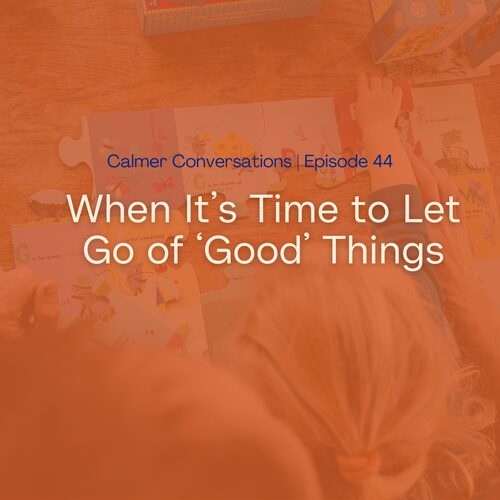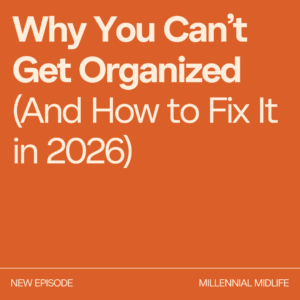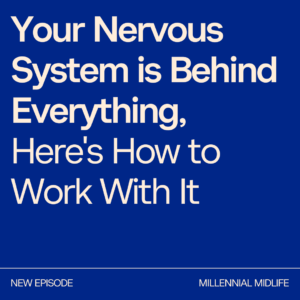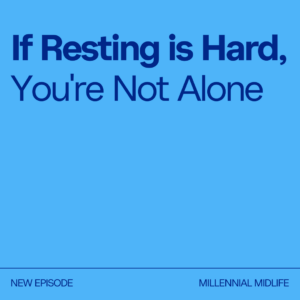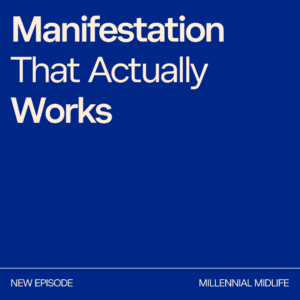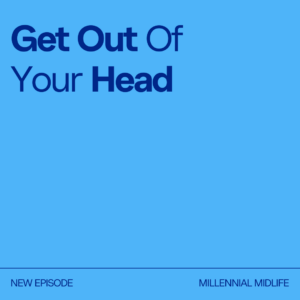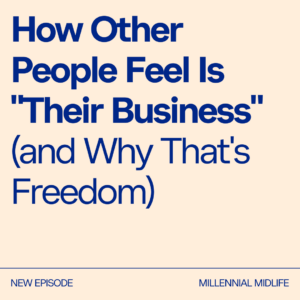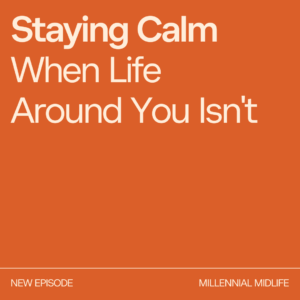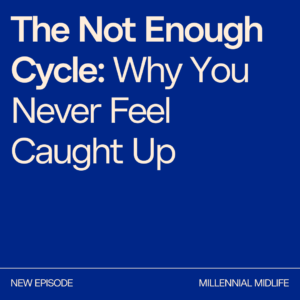Cecelia Baum Mandryk (00:01.742)
Hey and welcome to Calmer Conversations. I’m Cecilia, your host, and I want to start doing a little bit of grounding at the beginning of episodes. I do this before all of my group client sessions and it helps me immensely and it helps a lot of people there. They love this portion. So we’ll just do a quick, wherever you are, whatever you’re doing, maybe you’re walking. I know I listen to stuff a lot when I walk. Maybe you’re driving, maybe you’re cooking dinner, whatever it is that you’re doing, even if you’re just sitting intently listening to this.
I want you to take a breath, maybe a few slow intentional breaths, maybe even make a sigh or sound for the exhale. You might soften your gaze or close your eyes for just a minute. Don’t close your eyes if you’re driving or walking, but you might just feel into the ground or whatever it is you’re sitting on, standing on, and kind of come into yourself right now. Come into the present moment. And even if you’re going to do something else while you listen to this episode, intentionally checking in,
so that it’s not just going on in the background. And even if it is just going on in the background, acknowledging that and coming into that moment.
Cecelia Baum Mandryk (01:13.838)
Okay, that was helpful for me. Hopefully it was helpful for you. You might even pay attention to your breath for the next minute or two, seeing if you can breathe in and out through your nose, maybe even allowing it into your belly if that feels good for you right now. But this is something simple you can do before you start other things as well to bring yourself into the present moment, into what’s happening right now, which despite what we think, it’s very hard to multitask. So if you’re in the present moment, it is much harder to be spiraling.
or to be worrying in any kind of way. So, welcome, hi. I wanna talk about this concept that came up because it’s spring and I am a little confession here. I’ve never actually lived in suburban America before, so I grew up kind of out of the city on a little farm and we had horses and a little bit of land, but we were definitely like not in a neighborhood. And then I’ve lived in New York City and I’ve lived in
I’m Houston, but I was in the city, not in the suburbs. I’ve lived in Denmark and then moving back in, I lived in a city in Charlottesville and then lived on an island in Maine. So I’ve never actually been in kind of a neighborhood, like a proper American neighborhood. And I’m in one right now. I also want to say that if you’re listening right now, you might hear there’s some vacuuming going on and I would stop and say that I was going to look for.
for perfect podcast sound, but I don’t think that that will happen. So I apologize if you can hear that in the background. If you can’t, know that it’s happening. Okay, so I’ve never lived in suburbia and it’s spring when I’m recording this. It’s April, the middle of April in Virginia. And so I’m looking at people and I have lots of other comments about lawns and things like that, but I’m watching.
everything that’s happening, all the landscaping that’s going on, and not to mention all the growth that’s happening around me, all the flowers that are blooming, all the plants that are coming into being, this thing that kind of happens, it seems like almost overnight, like the world turns green and all the flowers are out, which I just think is so incredible and I love so much. But I remembered this thing that I, this kind of revelation that I had many years ago now that I think would be really relevant now, and it was so relevant to me then.
Cecelia Baum Mandryk (03:33.132)
So when I moved back to the US from Denmark, I decided I was going to become an accountant. I decided I was going to become an accountant for many reasons, most of them my own limiting beliefs about what I was allowed to do, particularly around my family of origin. And accounting seemed like a quote unquote proper job that I would probably be good at because I have some analytical skills and interest. And I could also maybe tailor it to how I wanted to work and live my life. So I kind of checked a few boxes.
I had no experience in accounting at all, like I had never taken accounting class, had never done accounting, really didn’t know very much about accounting. But I decided that this is what I was going to do. And so I came back and I did a couple things simultaneously. One, as I enrolled in the local community college to do all of my prereqs, which essentially is an undergraduate major in accounting. And I was going to do those in a year, which means I had to take a lot of things simultaneously. But I also wanted to apply to get a master’s in it because I figured that would be the ticket to kind of
jump-starting my career if that’s what I was going to have when I’m accounting. And so that meant I needed to take the GMAT and I needed to do it pretty quickly if I was going to apply in that cycle to get to start the masters the next year. So very tight timeline, very interesting how my brain works sometimes. I know that I could do it, I could force it all in. And because I was going from, I was moving from Denmark where I was living in a yoga studio and I was teaching yoga a couple times a day.
And I was living this life that I had unhooked myself from so many different things. And then was jumping back in to the U.S. and jumping right back into this place of being who I used to be, checking all the boxes, doing all the things, having this kind of good on the outside, shiny life. Studying for the GMAT, had about, I think I had four weeks. I might’ve had six weeks. I’m not, can’t totally remember now. I signed up to go through like a program.
like a self-paced study for the GMAT program. And I had my test date where I was going to take it and I really only wanted to take it once. So I wanted to do really well on it. And so I spent the majority of every single day, I was living with my parents studying for the GMAT, but because I was busy stuffing myself back into a little box, I needed an outlet and I needed something that was really physical that wasn’t going to tax my brain in any way because I was
Cecelia Baum Mandryk (05:57.678)
relearning all these math hacks and figuring out how to take the test and all those things. So if you’ve taken the GMAT, there’s a lot of strategy involved. And so I was learning all that and I wanted something that was very non-intellectual to do. there’s a nonprofit farm in Lynchburg, Virginia called Lynchburg Grows. And so I decided to volunteer there and it was great. I would go a couple times a week. It was so sweaty because it was August in Lynchburg and this farm in particular has a lot of glass greenhouses.
They’re beautiful. They’re so hot. also, where it is, it happened to be, they used to grow roses. And so they have at least one greenhouse full of old rose bushes. I mean, they’re beautiful. They’re the most amazing roses. I didn’t really grow up with roses. I’ve, have never cultivated them before. And one of the jobs I was given was, I promise this is going somewhere guys. One of the jobs that I was given was deadheading roses.
Now, if you’re a gardener, you know exactly what deadheading is. If you are not a gardener, which I was not at that time, I’d, you know, kind of helped parents here and there with different things, but not had not had. I’ve had, if you listen to the number of places I’ve lived, I’ve had a rather transient life. And so I had never lived long enough to have more than houseplants really. And small kind of container gardens on, on balconies, but nothing really big. So.
I was told to deadhead these roses. Now, the roses went to different places. They went to nursing homes and for weddings and all kinds of things like that, but you also had to care for them throughout the season so they’d continue to bloom. I didn’t know. I mean, I think I’d probably heard the word deadheading, but I had no idea what it was. And what they told me to do was to cut off any flower that was at prime or past. At prime or past. And this was like, it felt so criminal to me. I was going in there and I was cutting off these roses that were
They were at their peak. They looked so beautiful. And I remember the first day, I felt so like sad, almost cutting them off. And it felt, I was very cautious. I was very slow. And it felt, I didn’t quite trust them. I can be a very skeptical person. And so I was quite skeptical. I mean, obviously they’re the rose farmer responsible for the roses. So they probably know what they’re doing.
Cecelia Baum Mandryk (08:17.442)
But really cutting off the roses that were peak. I do remember collecting lots of these peak roses and taking them home as well. So I did it. But the surprising thing to me was, because I’d done apparently a relatively good job, I was given that task again the next week. And the bushes where I had been a little bit more ruthless had more blooms on them. And this blew my mind. And if you’re a gardener, this probably isn’t very surprising to you, but this is something I learned again. I’m married to a farmer and I cut
the flowers there also learned this, that you actually have to cut the flowers for the plant to produce more flowers. You have to cut the flowers for the plant to produce more flowers. And I remember when I was sitting there, and remember I’m like trying to force myself back into this accounting box, studying for the GMAT. And I remember thinking, I’ve been deadheading my life for the past couple of years, because for the three years prior, I guess, to that, I quit a job, I left a long-term relationship.
I left my life in many ways. I get rid of lots of belongings. I moved to India. I moved back. I had been taking away things that were at their peak or past, and it took so much courage. I remember when I first started deadheading my life, it was actually very hard to do. It took me a number of years to work up the courage, in fact, to make that first snip. But then when I did, I felt the freedom and I felt
my energy able to redirect itself into new growth areas. And that’s exactly what you’re doing with the plant. You’re allowing the resources to, instead of going to this flower that’s about to die, you’re allowing it the resources to go to something else, to new growth. Now, with humans and in personal development, this is exactly what we do. We look, if you have a willingness to grow, if you have a desire to grow or desire for things to be different, then you can start to look at your life and you can start to,
see areas that are perhaps past their prime. And what I mean by that is they are perhaps habits or they are thoughts or they are ways of being that are no longer serving you. And I don’t mean that you need to radically change your life like I did, but that over and over again, we can see in our life, I used to tell myself this and this actually helped me at some point in time. It helped me thrive. It helped me become who I am, but now it’s no longer helping me. And if we can do this with discernment,
Cecelia Baum Mandryk (10:44.588)
and you can do it with regularity, then you continue to grow and thrive. And you also nurture yourself and you allow yourself the capacity to also rest and regenerate because you’re no longer putting your resources in places that aren’t serving you anymore. And this is what we do, right? This is what I help people do individually. It’s what I help people do collectively in the Life Lab is to actually look at their life and we recognize, I used to have this habit of
pleasing everybody else around me. And this was really beneficial when I was a kid. It meant that I got my needs met. It meant that my parents liked me. It meant that I didn’t get yelled at. And that is so amazing. And now that I’m in my 50s, I don’t think I wanna do that anymore. This is no longer serving me. I’m recognizing that this habit, this way of being is no longer serving me in any way. And so I’m going to let it go. I wanna say that like that first day that I was deadheading the roses,
It does take discernment. does take sometimes another set of eyes. Sometimes it takes actually being able to see your life from the outside to notice, to see the rose bush from the outside, to notice what actually isn’t working anymore. And I think that’s one of the most beautiful parts of coaching is you let somebody else see your brain as well. And if you’re doing it in the Life Lab, you’re letting other people see your life as well so that we all kind of collectively gain from.
this introspection from this examination. And when we live this more examined, more thoughtful life, it’s when we get to continue to cultivate, when we get to continue to create this rose bush that is thriving, that is healthy, that is vital, that is continuing to produce not in a capitalistic, over the top, produce all the time kind of way, but
in that it is becoming its most full self. It is becoming its best rosebush kind of self or its favorite rosebush self if you like favorite over best. Okay, so I sometimes, I think a lot of people learn best in stories, but that is the story of deadheading and how it might apply to your life. This is work, again, if you’re feeling stuck, it might be that you need to start doing a little deadheading. It might be that you need to start doing a little pruning.
Cecelia Baum Mandryk (13:06.164)
And again, it’s okay if it feels a little scary. It does take courage to do. It is something that is not necessarily come naturally to us because the survival part of your brain wants to hang on to every single thing that has potentially worked in the past. So if it feels tough, know that that’s okay. If you want support doing it, either in a group or individually, reach out to me and let’s figure out what is possible for you. I know that something else is possible. I know that even if you feel really stuck in your circumstances, that your experience of your circumstances can change.
And wanna say that again, because it’s such a crucial point. Even if your circumstances don’t change in life, your experience of your circumstance can change. And when your experience of your circumstance changes, your life changes. And then the circumstances kind of naturally resolve themselves anyway, if it’s possible for them to. But the deadheading is a crucial step, letting go of what is no longer serving you. Okay.
I hope that this was something maybe insightful for you or at least fun to learn about. get to learn a little bit about my accounting journey and me studying for the GMAT. By the way, I did do pretty well in the GMAT and I got into a top five accounting master’s program that I then very thankfully rescinded my acceptance of a week before it started the next year. So that’s a little the conclusion of the story. I did not in fact become an accountant. Sorry, accounting world. Thank you.
the personal development world perhaps is benefiting, you’re benefiting, but I didn’t become an accountant. All right. I hope you have a beautiful day. Thank you so much for being here. I love you. I’ll see you next time.

